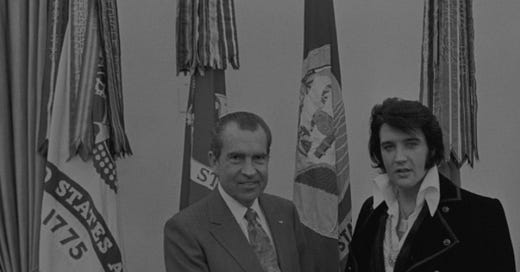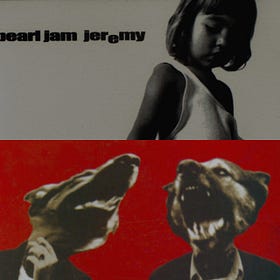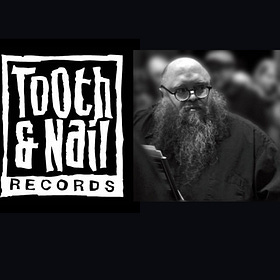Conservative Christians & Evangelicals Against Rock Music
Demonization Of Rock'n'Roll And The Importance Of Rock Musicians
‘’I feel that the people that are most threatened by punk are people that have a lot invested in the way things are. People that want to believe that the world should be run by white people for example, people that want to believe that it's not right for a man to kiss a man…people that think that there's one religion. Whether it is Christianity, or Islam, or Buddhism.’’- Pat Blashill
Kirsty Lohman notes that ‘’individual practices of punk are linked with group practices, thereby, suggesting that in order to fully understand the meanings attached to 'punk', it is important to retain a lens on the individual as well as the social’’(Lohman, 2017, p.160). The importance of the environment and music being a reflection of the collective is important to note, similarly, as Theodor Adorno argues.
When considering the political atmosphere of the 1960s, the Civil Rights movements (1954 – 1968) and Civil Rights Act (1964) unified and at the same divided the society. Hippie and counterculture movements agitated for peace, human rights and condemned American activities in the Vietnam War (1955-1975). However, the agitation for liberation of minorities, identities and sexuality by youth movements and counterculture musicians, particularly in the rock genre, generated a longstanding backlash.
This was partly due to conservatives, especially conservative Christians, as ’’Evangelicals made national headlines in 1974 when they protested the use of textbooks they believed contained a liberal agenda to spread ideas such as multiculturalism’’ (Saylor Academy, 2012). The Evangelicals' fear of multiculturalism is one of the elements which contributes to their dislike of rock music. Dr. Julian M. Hayter explains that ‘’a major theme running through the history of Southern politics has been the fear of a negro take-over of the political and governmental structure’’ (Hayter, 2015, p.512). This is an especially important observation when considering that rock music was greatly shaped by African American musicians such as Little Richard, Sister Rosetta Tharpe, Billie Holiday, Chuck Berry, B.B King and Jimi Hendrix. These musicians founded, created, and shaped the jazz and blues genres further, which then influenced and evolved into the rock'n'roll and its many genres. Taking note of the racial tension prior to and in the 1960s, conservative Christians had found rock music threatening not only because of its multiculturalism but also what this meant in terms of the integration of non-white Christian culture into American society.
The Klansman and White Citizens` Council Leader Asa Carter in 1956 ‘’demonized rock`n`roll as: ‘’sensuous negro music’’ that was destroying the ‘’entire moral structure of man, of Christianity, of spirituality in Holy marriage…of all the white man has built through his devotion to God’’ (Stephens, 2018,p.17). The Pentecostal movement has been particularly targeted due to the movement's popularity in African American churches. The Pentecostal movement is significant for rock music as its musical tradition and integration in religious practices have been adapted in rock music.
Figures like Elvis Presley, Jerry Lee Lewis and Johnny Cash were greatly influenced by Pentecostalism. Elvis Presley copied the southern gospel singer Jake Hess, for example. Therefore, the movement's growing popularity caused ideological challenges when it comes to issues of race. Randall J. Stephens notes that rock'n'roll and Pentecostalism were related :
‘‘from the earliest days of the genre…In fact, the culture of southern Pentecostalism influenced early rock in startlingly powerful ways and helped to give birth to the new genre. Such dynamic performers and chart toppers as Elvis Presley, Johnny Cash, Little Richard, B.B King, Sister Rosetta Tharpe, Jerry Lee Lewis, and James Brown all were natured by close associations with Pentecostal and holiness churches in the South’’(Stephens, 2018,p.14).
Christian churches criticised the Pentecostal movement for highlighting mystical manifestations like Glossolalia, promising false healings, and appearing anti-intellectual. As musicians did not alienate themselves from religious beliefs, the demonisation of rock`n`roll music ties partly with multiculturalism and miscegenation. The popularity of music which expresses such ideas or promotes Pentecostalism means that more people are exposed to such ideas. Popular musicians such as Elvis Presley were blamed for the popularity of rap music suggesting that multiculturalism and the integration of black music in rock is to blame for the popularity of rap music. Most prominently this was expressed by Chief Dennis R. Martin, who will be discussed in future posts.
It is also worth discussing how such musical figures had become more politically interested as their careers progressed. Elvis Presley is a famous example where rock music icons become more conservative. Presley was a figure that initially broke aspects of conservatism in 1950s America for the youth market. He became more conservative in later years if his pro-Vietnam War stance is considered. Contrasting the Peace Protest stance that John Lennon displayed.
Lennon proclaimed that The Beatles were “bigger than Jesus’’ (Carey, n.d.) in 1966, not only causing controversy with religious groups, but also indicating how influential musicians had become. Whilst Presley`s dislike towards Lennon started from the first time they met, President Richard M. Nixon and Elvis Presley met at the White House on December 21st of 1970 to discuss The Beatles. Elvis quickly let Nixon know that the Beatles ‘’were a canter of anti-Americanism’’ as they slandered America back in England.
President Nixon gave Elvis what he desired, ordering the ‘’Bureau of Narcotics to give Elvis a badge’’(Williamson and Lewis Shaw, 2015,p.247). Whilst Elvis asked Nixon to keep Lennon out of the United States, ‘’Nixon quickly offered the idea that he thought Elvis could reach young people. Elvis quickly agreed but added that he must work only in his own way’’(Williamson and Lewis Shaw, 2015, p.247) . Importantly, Elvis, once a symbol of rebellion for the youth movement, had become a political tool indicating that music is politically driven and bound to be integrated and appropriated by politics.
Music as a political tool had been used strategically before. Bush Jones and Sheldon Winkler both agree that ‘’World War II was one of the most important periods for American popular music development’’(Gordeeva, 2021). As Americans from across the United States listened to the same songs on the radio, their ‘’heterogeneous and conflicting identities harmonised to form what Benedict Anderson labels as an 'imagined political community’’(Gordeeva, 2021). This demonstrates music's ability to create a community and unity that political figures valued. Annegret Fauser explains that "no other event in the US history mobilised and instrumentalized culture in general, and music in particular, so totally, so consciously and so unequivocally as WWII" (Gordeeva, 2021). This was achieved by American wartime songs such as ‘’God Bless America’’ (1938). Written by Irving Berlin during World War I in 1918, with the second World War it was revised:
‘’God bless America, land that I love.
Stand beside her and guide her.
Through the night with the light from above’’
(Berlin, 1939)
The song is a tool of unification of American society in World War II. It generates a sense of pride and patriotism in lyrical passages that promotes American Exceptionalism. The original song in 1918, had the line ‘’To the right with the light from above’’ but was changed, due to the phrase ‘’to the right’’ (God Bless America The Story Behind The Song, n.d.). Berlin wanted to make the song for Americans, not divide them politically as ‘’the right’’ had been associated with conservative politics. The song is the ‘’unofficial anthem of the United States…which hit number one after 9/11 and is constantly played at sports events’’ (Edmondson, 2013, p.107)As discussed before, from a sociomusicological perspective, music reflects a collective and for this reason is used strategically by institutions.
Music is significant in the formation and stabilisation of American identity. Music is not only an art form or an artistic pleasure, but a psychological tool of control. Throughout American history, the effectiveness of music has been acknowledged and used strategically, not only in wartime efforts, but in organisations such as the US 1980s Parents Music Resource Centre (PMRC). The mainstream success of grunge, a democratic leaning movement which promoted activism against conservative politics, was addressed by figures such as Bill Clinton in his presidential election campaign (we will dive into this in the future, but you can READ THIS).
’God Bless America’ also highlights the importance of religion for the United States. Not only does this song promote American exceptionalism but religion, specifically Christianity. Whilst Elvis supported political activities and never alienated himself from religion, rock musicians never stopped receiving criticism. In early December of 1980:
‘’one hundred Evangelicals gathered with the minister on a chilly night in Saint Paul, Minnesota, at Zion Christian Life Centre’’ (Stephens, 2018, p.3); to burn and destroy rock and pop records, especially targeting the Eagles, Donna Summer, Led Zeppelin and the Beach Boys. Youth Ministers especially liked to target KISS, claiming that the band's name ‘’stood for ‘’Knights In the Service of Satan’’ (Stephens, 2018, p.4).
This example showcases Adorno's evaluation of music speaking in the plural. Evangelicals are protesting against rock fans as well as protesting against the rock community's ideology. They are against the music that the rock community is listening to and this is a confirmation that Evangelicals believe that music has a significant impact on the listener. Christianity in the 1980s, just as in in the 1960s, found rock music threatening. This same occurred in the 1990s with the explosion of grunge.
‘’[Oregon Extension student] James S., who attended in the late 1990s, recalls a time when the headmaster of his Christian high school publicly shamed a group of students into tearing up and throwing away their tickets to a Pearl Jam concert (and in the 1990s Pearl Jam tickets had huge cultural significance). ‘’He told us that even if we sold the tickets to someone else, we would be guilty of corrupting that person through our moral failure’’’ (Francis, 2017,p.80)
As discussed in previous posts, grunge was anti-religious and such a statement indicates how it clashed with the religiously affiliated. The situation indicates pressure from Christianity to not spread or share rock music, specifically Pearl Jam, as liking such music is indicative of one’s moral failure. To combat anti-religious messages, Evangelicals and conservative Christians formed Christian rock bands in the late 1960s deciding ‘’that rock music could serve the church and the cause of Evangelism’’ (Stephens, 2018, p.13). Evangelicals approached pop music in the same manner, leading to contemporary Christian music ‘’raking almost a billion dollars annually by the late 1990s’’ (Stephens, 2018, p.25). Not only does this indicate the prominence and importance of Christianity for American audiences (when considering the billion-dollar sales), but it highlights how influential, powerful and threatening music can be for political organisations and figures, especially those who have contributed to and maintain American social systems. This has only increased over the years as celebrities arguably hold an even greater influence on society. Michael Hogan argues that artists such as Frank Zappa ‘’did more to win sympathies for ‘the American way of life’ than any U.S politician or military leader, probably with the exception of John F. Kennedy’’ (Hogan, 1999, p.491), thus symbolising how important rock musicians are for society.
Reading daily exercises the brain, improves sleep and reduces stress, so why not read some more?! Check this out:
Protest Music: Grunge Pt. II
The 'milieu' (moral temperature) is responsible for the atrophy or development of individuals, especially crucial for artists and their art, as if ‘‘Oliver Cromwell had not lived in the milieu of Great Rebellion, he would have remained what he had been- a stern Puritan concerned more with his farm and family than with public affairs’’ (Blaukopf and Mari…
Chris Estey : Tooth & Nail Records, Rock and Grunge | Interview
Over this past weekend, I had the amazing opportunity to ask some questions to Seattle writer, music journalist and publicist Chris Estey. Currently, he is the press agent at XO Publicity and he was the executive assistant at Tooth & Nail Records from 1999–2002. The success of Christian punk, ska, pop punk and metalcore is inseparable from the success o…







